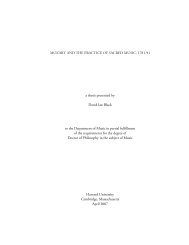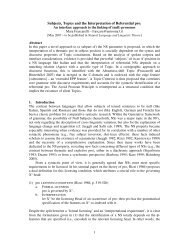draft of November 2011
draft of November 2011
draft of November 2011
Create successful ePaper yourself
Turn your PDF publications into a flip-book with our unique Google optimized e-Paper software.
dealt with in a language. The point we are making here is that the weakening <strong>of</strong> the definite<br />
semantics <strong>of</strong> the Italian lo/la is due to the obligatoriness <strong>of</strong> DPs in Italian. Note further that<br />
these non-referential uses involve clear verbal arguments, arguing against an intrinsic link<br />
between D, argumenthood and referentiality in Italian as proposed by Longobardi (1994). If<br />
lo were to be analysed as involving less structure, e.g. as a np, the immediate question is why<br />
an NP argument is possible at all in Italian all <strong>of</strong> a sudden and how it is different from Greek.<br />
(77) Gianni sta cercando un idraulico ma non lo trova<br />
Gianni is looking-for a plumber but cannot find one.<br />
Note that even Italian, does not universally allow ”definite” pronouns to support property<br />
anaphora. For instance, when the object is plural, as in (78), the plural <strong>of</strong> lo/la, is not<br />
acceptable. Instead, the clitic ne needs to be used. 29<br />
(78) a. Q: Maria ha trovato delle aiutanti?<br />
Q: Maria has found <strong>of</strong> helpers?<br />
Has Maria found helpers?<br />
b. A: No, ?le/ne ha trovate<br />
A: No, them.cl/ne has found<br />
No she has not found.<br />
(79) Gianni sta cercando degli aiutanti per l’ufficio ma non ?li/ne<br />
Gianni has-been looking-for <strong>of</strong><br />
trova<br />
find-3sg<br />
helpers for the-<strong>of</strong>fice but not them.cl/ne<br />
Gianni has been looking for assistants for the <strong>of</strong>fice but cannot find any.<br />
We will speculate in section 4.4. on the effect <strong>of</strong> number, but, for the moment, suffice to say<br />
that Italian systematically involves a D element even for arguments that are not referential.<br />
This D element may even be an apparently definite D like lo/la or an indefinite one like<br />
ne. Greek pronouns do not support property anaphora. Instead, the relevant readings are<br />
obtained through IAD which involves NP ellipsis.<br />
29 Notice that the plural le can be used in (78) if the answer is positive, but it forces a discourse transparent<br />
reading,which is not the relevant one here.<br />
42
















